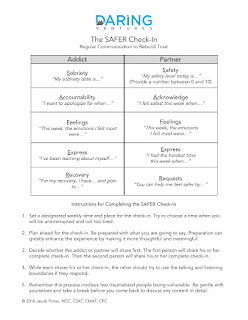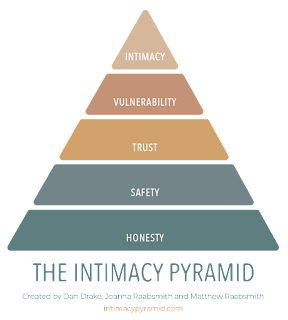The Subtle Nuances of Boundary-Making
Created in the Image of God
When our spouses act out, try to manipulate us, or lie, the parts of us that have been previously wounded by their behaviors become activated causing us to experience fear, anger, sadness, and the like. Those parts of us know how this has gone before, and they are worried we are going to be hurt again. They encourage us to lash out in anger, pacify in fear, or eat a gallon of ice cream in despair...anything to keep us from experiencing the hurt they know is coming. Watch out! they scream.
The wonderful news about our parts is that they do not constitute our whole. While God created the unique parts of our personalities; experience shapes them. God designed us in His image, and the emotions we experience out of that image, our true self, are connectedness, creativity, courage, confidence, compassion, curiosity, clarity, and calmness. This Imago Dei is "the seat of our authentic spiritual connection to the Divine" and is "undamaged...reflect[ing] the fruit of the Spirit." Our True Self, by the grace of God, leads our burdened parts to healing resulting in a congruence between who we truly are and how we act.
No Bad Parts
None of our parts are bad. They are simply "unique aspects of our personalities...who want something positive for us, but oftentimes become burdened with pain (or strategies for coping with pain) from negative life experiences."
Let's talk about our parts and the role they play in three different reactions to conflict: Pacifying, Lashing Out, or Setting a Boundary.
Pacifying
The Pacifying Response has some great characteristics. It attempts to use kindness, gentleness, and respect to bring about peace. The problem with pacifying is that our burdened parts can only drum up so much kindness, gentleness, and respect. Sooner or later we snap then blame ourselves for the lack of peace we have and the conflict in the relationship. This philosophy also places full responsibility for the relationship on the pacifier since it requires nothing from the partner and disregards the legitimate needs of the betrayed spouse. The lack of loving boundaries allows the addicted spouse to continue their abusive and immoral behavior to their own destruction.
Lashing Out
The Lashing Out Response really emphasizes the truth that infidelity, lying, and gaslighting are abusive. It honors the righteous anger over injustice. Unfortunately, our parts can only manage the "righteous" part of their anger for so long. Eventually, disrespect and rage take over. This philosophy lays all responsibility for the inappropriate actions of the wife (screaming, throwing things, belittling - all abusive behavior as well) at the feet of the addicted spouse. It says the addict deserves what is coming to him and does not allow the mercy of God to be a part of the equation. The lack of loving boundaries causes the betrayed spouse to act out of her burdened parts, betraying the very courage, compassion, and calmness God made her to exemplify while tempting the addict to wallow in his shame.
What does all this crazy psychobabble have anything to do with boundaries?
Setting boundaries honors our God Image by speaking for our parts and acting out of our True Self. Our burdened parts try to control our spouse by pleasing him, hoping he will one day decide to love and cherish us. They rage hoping they can elicit a fear-provoking response that leads to change. But they are doing it because they know we are precious to God, deserving of love, honor, and respect. When we unburden them by listening to their fears and honoring their experiences, we then have the capacity to speak for them by setting a boundary that upholds our dignity in the eyes of God.
Our True Self, made in the Image of God, guided by His Spirit, and fueled by His grace, acts solely out of love. When we honor and listen to our parts that are trying to protect us, we then can move toward those parts of our spouse that are causing him to act in such hurtful ways with curiosity and compassion, protected by our boundary and acting in congruence with who we truly are.
The Takeaway
I believe that without this or some similar kind of understanding of your inner self, we will create unhealthy boundaries or fail to create boundaries which will cause us a world of hurt, pain, and confusion - creating more burdened parts! Instead, we can embrace the freedom and flexibility of knowing we are multidimensional beings. "In fact," as Jenna Riemersma in her book, Altogether You, mentions, "when we are in our God Image, we are much more able to wisely observe whether healthy boundaries are being respected - remembering that a healthy boundary is about keeping oneself safe and not about changing someone else's behavior. We are also more able to follow through, because our wounded, fearful, parts are not running the show." Rage does not fuel our request that our husbands do their recovery work in order for you to remain in the relationship. Love does. Fear does not drive you to just "focus on yourself" in order to keep from rocking the relationship boat. You know, with the courage of your true self, you can both focus on yourself and set a boundary with love.
And, by the grace of God alone, maybe your husband will begin to act out of his true self as well, unburdening his own parts one by one. Then, and only then, will he be able to love, honor, and cherish you in the way God meant for him to. Lord, make it so!
*All quotes are from Jenna Riemersma's Altogether You. To learn more about Internal Family Systems, please visit www.jennariemersma.com.
Make sure to check out my workbook, Using Boundaries to Find Peace for Every Part of You.
Click Here to Schedule a 1-Hour Session with Coach Casey




Comments
Post a Comment